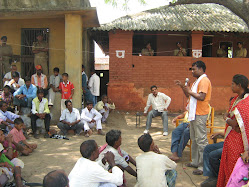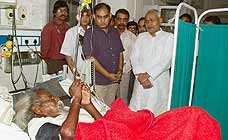The Musahar community, in Varanasi district, is socially and economically one of the most marginalized communities in India and they are poorest amongst poor. The Musahar community falls under the category of the Scheduled Caste. Although the practice of untouchability is a crime in Indian law the Musahar community is not allowed to enjoy ordinary social life with the mainstream society and to share common amenities in the village.People from the Musahar community are deprived of owning property, means of livelihood, and education. For their survival they work as laborers in the agricultural fields or do some other hard physical labour. The remuneration for such work is given in kind, mostly discarded food or grains. Due to this they do not have any savings that they could use during times of need. This forces them into starvation at times when they have no regular work. In such a situation Musahar community largely depends upon the Public Distribution System (PDS) to get food grains at subsidised rate for their survival. But due to corruption in the bureaucracy and due to an almost defunct judiciary, often weaker sections of society are denied of the food grains in the villages because the PDS licensee can easily escape from their criminal offences and malpractices. For further information please also see HA-003-2007.According to the information received 18 Musahar families were not given ration cards until 2006. After a long, strenuous and continuous, struggle 15 Musahar families were given yellow cards which are issued to those families whose living conditions are identified as bellow the poverty line (BPL). BPL families are those who are identified in the rural area with an annual income of Rs. 12000 [272 USD] or less and urban families living in declared and undeclared slums with an annual income of Rs. 17000 [386 USD] or less. As far as the Musahar families are concerned they are qualified for Antyodaya Anna Yojana cards (red cards) which are issued to the poorest of the poor amongst the BPL families.It has been alleged that 3 Musahar families of Indrajit Musahar, Gulab Musahar and Dinesh Musahar, are still deprived of even BPL (yellow) cards.It is alleged that these families are living in Sarai village for generations. Even then the village head of Sarai village was initially not ready to accept that these Musahar families were the residents of Sarai village and thus he denied the right of livelihood of these Musahar families and forced, them including children, to die of hunger. Mithai Musahar, who is one of the BPL card holders (card no. 497457) is not able to buy the food grains on BPL card and his grandson Sanju, who is also suffering from measles, has reached on the verge of dying from starvation due to malnourishment caused from lack of food.It is also alleged that the upper caste people, who are above the BPL, are enjoying the use of red cards which can be issued only in the favour of the poor amongst poorest. It is also alleged that Mr. Jagdeesh Patel the husband of village head of Sarai village Mrs. Urmila and Mr. Chandrashekhar Singh, who is Village Secretary of Sarai village have given the red cards to those people who belong to upper caste families and who are disqualified for holding red cards. BACKGROUND INFORMATION: The PDS was initiated in India decades ago to help the marginalised and the poor sections of Indian society. It is a system through which the government distributes rationed articles for subsidised price. However, the PDS shop owners/licensees do not distribute the articles for the poor people, but sell the articles in black market to private hotels.Illegal dealing in rationed articles is a crime under the provisions of the Essential Commodities Act, 1955. However, it is for the local police to register a crime and investigate it. But since the police fail to do this duty owing to massive corruption and the rationed articles never reach the needy.The same long standing question is that why does it happen? Why the people, who are already in a convenient position and enjoying the privileges of good social and economic living conditions, could dig into the resources earmarked for the poor amongst the poorest?It is possible only because of the endless division of Indian society on the basis of caste and institutionalised corruption. Centralised, complex and absolutely obscure nature of bureaucracy leaves no place for transparency at any level within the system; even the judiciary is no exception to this. In such a situation, the state police have been reduced to a uniformed, but bottom to top corrupt force paid from the government exchequer. This is probably the reason why in spite of several judgments and directions of Supreme Court of India regarding right to food the judgments failed to have any effect to change the status quo. The plight of 18 Musahar families of Sarai village who are still deprived of the benefit of the social security schemes and right to food is a glaring example. SUGGESTED ACTION:Please write to the Chief Minister of Uttar Pradesh to express your concern for the state government's abject failure to address the ongoing corruption and negligence of district administration at different levels which is causing starvation and malnutrition among Musahar community. Please call for investigations and disciplinary action to be taken against the government officials responsible for failure to ensure the right to livelihood of the poor amongst the poorest.
Administrative Office: QTR.NO - 480/A, Neora Colony, Khagaul, Patna, Bihar (India) - 801105. Mob - +919031072463, Email - umesh.kumar.manjhi@gmail.com, dalits.wathch@gmail.com
Subscribe to:
Post Comments (Atom)

















No comments:
Post a Comment